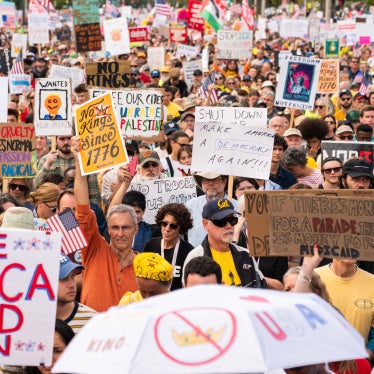President Barack Obama
The White House
1600 Pennsylvania Avenue NW
Washington, DC 20500
Dear President Obama,
We write to urge you to raise a number of critical human rights concerns with Prime Minister Hayder al-Abadi, both in private meetings and in any public comments related to his visit to Washington later this week.
As you know, Human Rights Watch and others have documented numerous horrific abuses by the extremist group Islamic State (ISIS) and by Iraqi security forces and sectarian militias that have assumed a major role in the government’s fight against ISIS. As militias and government forces have advanced in recent months, violations of the laws of war and other abuses by these forces have increased. in the area around Amerli and more recently in and around Tikrit.
Recent comments from a range of senior US officials expressing concern about these abuses and their implications for Iraq’s long-term security are very important, but such criticism is undermined by the US’s policy of providing unfettered military aid to the government of Iraq.
In their enhanced role, the sectarian militias have carried out abductions; summary executions, including beheadings; torture and other ill-treatment; and forcible displacements of thousands of families in areas recaptured from ISIS. We are concerned by recent statements from Prime Minister Abadi that appear to walk back from – or negate – earlier commitments to address accountability for these serious abuses both by reining in the militias and taking steps to deal with its own forces.
For instance, the appointment of a member of the abusive Badr militia as interior minister and another Badr member as human rights minister reflects an inability or unwillingness on the part of the al-Abadi government to rein in militias, despite their history of atrocities. The government also failed to protect civilians in the area around Amerli after Iraqi government forces and affiliated militias recaptured it from ISIS last September, with the assistance of US air strikes, and reports from Tikrit indicate that similar abuses recurred there as well.
The increased influence of militias on Iraqi military operations has led to an escalating crackdown on local and international media, which runs counter to Prime Minister al-Abadi’s pledges to enhance media protections. Recently the prime minister has backtracked on earlier statements that he intended to hold militia leaders accountable and protect press freedoms. The prime minister’s inability or unwillingness to make good on his pledges to hold militia members accountable for grave abuses has reinforced the prevailing climate of impunity, further empowering militias to intimidate their critics.
The Iraqi government’s failure to enact key reforms relating to the country’s desperately corrupt and inept criminal justice system has allowed state security forces to enjoy complete impunity for serious rights violations alongside impunity for government officials within state institutions—some of which the US had a role in setting up, such as the Integrity Commission and Inspectors General in the Interior and Defense Ministries. The deeply problematic Anti-Terrorism Law remains in place, leaving suspects in criminal trials with little or no access to an adequate defense.
Iraq faces serious security challenges but these are being exacerbated by the government’s failure to adopt a range of urgently needed reforms. This has undercut security for all Iraqis. Since ISIS took control of Mosul in June 2014, the expanded fighting and widespread abuses by ISIS and by government forces and militias have brought the number of internally displaced Iraqis to almost two million. Tens of thousands have no basic services, lack adequate food and shelter, and remain vulnerable to attack by ISIS and militias.
Iraqi government officials and members of the security forces as well as ordinary Iraqis have told Human Rights Watch that they believe the tactical gains that US air strikes have achieved against ISIS have been badly undermined by the abuses of security forces and militias. By providing effectively unrestricted military assistance to Iraq despite increasing militia abuses, the US sends a message – despite public statements to the contrary – that they are not of serious concern.
We urge you to take the opportunity when meeting Prime Minister al-Abadi to make clear that US support for Iraq requires more serious efforts by the government to protect basic rights of all Iraqis. In particular, the US government should:
- Condition security aid to Iraqi security forces on the government taking steps to: disband abusive militias; better protect civilians in areas where militias are deployed; and hold accountable commanders and others responsible for serious crimes through a fair criminal justice process;
- Urge the Iraqi government to repeal or amend the Anti-Terrorism Law, whose overbroad provisions permit the authorities to prosecute individuals solely on the basis of their association with a particular tribe or sect;
- Assist the Iraqi government to develop a comprehensive plan that includes measures to assist displaced persons to return home voluntarily, safely and in dignity, promote reconciliation among Iraq’s deeply polarized communities, and ensures that all those responsible for committing serious rights abuses are held accountable; and
- Ensure that the US Embassy in Baghdad has sufficient financial, technical, and personnel support to undertake robust human rights vetting for all US military aid and security assistance; and encourage regular joint monitoring visits by the ambassador and other US officials to security force training sites.
It is crucial that you and other US officials make clear to Prime Minister al-Abadi that the US will not turn a blind eye to serious abuses by Iraqi government forces and militias, and that future military support to his government depends on the speed and effectiveness with which it addresses the current human rights deficit.
Sincerely,
Sarah Leah Whitson
Executive Director
Middle East and North Africa Division
Human Rights Watch
Sarah Margon
Washington Director
Human Rights Watch








